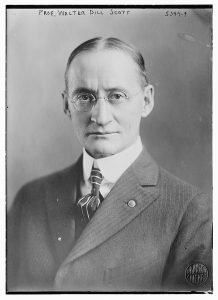17 Industrial and Organizational Psychology
Walter Dill Scott (1869-1955)

Walter Dill Scott is the first American applied psychology, a title he gained for his ability to apply psychology to the business and advertising fields.
Scott was born in Cooksville, Illinois. Scott entered university as an undergraduate intending to become a teacher, however, his interest in psychology eventually led him to leave for Germany in 1898 (Lynch, 1968). After completing his Ph.D. in Wilhelm Wundt’s lab, Scott returned to America to become a psychology professor at Northwestern University. Scott became highly interested in the applications of experimental psychology, especially in the business field.
In 1901, Scott had an opportunity to educate advertisers and businessmen on the usefulness of psychology in advertising (Lynch, 1968). In his presentation, Scott gave examples of experimental research relevant to human attention, and how this applies to advertising techniques. For example, Scott presented research on how humans can only comprehend 4 objects at once, and therefore full-page magazine ads are most effective as they maintain the reader’s attention. Scott’s other major contribution to business psychology are his 1910-1911 works, titled The Psychology of Business. He stated that little attention has been given to efficient hiring processes and proper employee motivation and productivity. Scott believed that employee productivity can be improved in the correct working conditions, where the employee feels supported by the company and their coworkers, and believes that their job is important. Scott also argued for the importance of healthy competition, training new employees by imitation and an employer interested in the welfare of their workers. In such a working environment, the employee is motivated to reach their working goals, and the business is able to run efficiently.
Scott also introduced the importance of employee evaluations in Advertising and Selling (1914), a work based on his experience evaluating the hiring process of salesmen in the American Tobacco Company (Lynch, 1968). Scott found that the managers could not agree on the most qualified employees. Therefore, Scott trained the hiring managers on effective methods of hiring employees, but more importantly, he proposed an intelligence/skill test to be added to the hiring process to counter the subjective nature of interviews. Based on this work, Scott was hired by the Bureau of Salesmanship Research at the Carnegie Institute of Technology in 1916 to help companies develop efficient hiring methods. Scott even offered his hiring services to the American army during WWI, by creating a scale used to hire military officers.
Scott was elected the president of the American Psychological Association in 1918. Although he was criticized by many psychologists because of his application of psychology to business, many eventually came to understand the importance of his work. Scott triggered the progress of applied psychology in America and had a lasting influence on the modern Western work culture.
References
Lynch, E. C. (1968). Walter Dill Scott: Pioneer Industrial Psychologist. The Business History Review, 42(2), 149–170. https://doi.org/10.2307/3112213
Further Reading
Bryan, L. L. K., & Vinchur, A. J. (2012). A history of industrial and organizational psychology.
